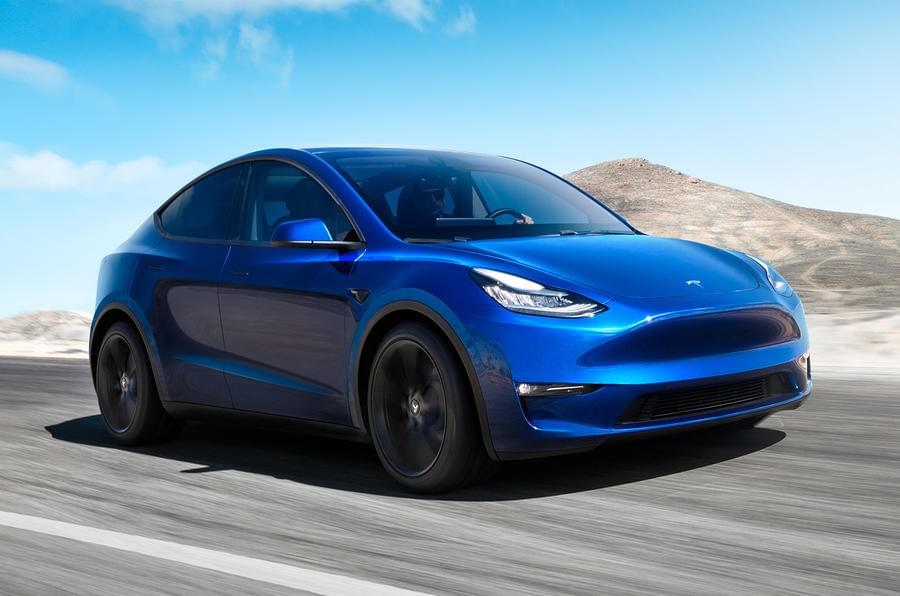
Wall Street investment website Seeking Alpha warned that, for Tesla Motors, it would be more of the same clash between bullish fanboys and bearish short-sellers, with a post appearing more than two hours ahead of CEO Elon Musk's quarterly earnings call. The EV automaker's fourth-quarter non-GAAP (meaning it doesn't follow generally accepted accounting procedures) earnings per share of $2.14 beat expectations by $0.38. Apply the numbers from generally accepted accounting procedures, and the net earnings per share of $0.58 fell short of Wall Street's expectations by $0.26 cents per share.
Tesla's gross revenues for the quarter were $7.38 billion, up 2.1 percent year over year, and $0.3 billion higher than expectations. That's from revenues, generally consisting of the gross value of the cars Tesla sold, parts and accessories sold, and any money it made off of selling EV credits to old-fashioned automakers. GAAP net income was $105 million for the quarter, and Tesla lost $862 million for fiscal year 2019.
The first quarter of each year, January through March, are traditionally tough for the auto industry in general, Musk warned in Tesla's call, an indication the company doesn't expect to post a profit after the current quarter. Tesla has posted a few quarterly profits over the years, even when following GAAP rules, but it has only even lost money when reported on an annual basis.
Anticipation of a positive report had Tesla's stock price closing at $580.99 per share Wednesday night. That was up $14.09, or 2.49 percent for the day. Nearly two hours after the market opened Thursday, Tesla's stock was up $57.83, or more than 10 percent, to $638.02 per share, with the company topping GM, Ford, and Fiat Chrysler combined, in terms of market cap.
Key Takeaways From Tesla's Q4 Investor Call: Model Y In Production, Cybertruck, Autopilot
• Tesla "started producing the Model Y in limited amounts," in the Fremont, California, plant in January. Musk suggested the Tesla Model Y compact crossover, which he believes will become the automaker's bestseller, is rated with a 315-mile range by the EPA, even with all-wheel drive. He says the real-world range actually is longer than 315 miles, "with great acceleration and top-speed," though as of Thursday morning, the Model Y's rating had not yet been posted on the EPA's website. Musk has also confirmed that full production is now slated to start this spring instead of this fall, as previously planned, meaning customers may have their Model Ys much sooner than anticipated.
• The automaker delivered 112,000 vehicles in the fourth quarter of 2019, Musk said, and last year Fremont factory production levels matched NUMMI's best year there, 2006, when General Motors and Toyota built more than 428,000 vehicles, according to Wikipedia.
• Tesla's radical, controversial Cybertruck pickup unveiled last November was designed "without any preconceptions of how a pickup truck should look," Musk said. "We will sell as many as we can make. The product is better than people realize."
• China's coronavirus crisis may delay deliveries of Tesla Model 3s from its new Shanghai assembly plant for a week to a week and a half, Musk said. Otherwise, Musk had good things to say about the plant, and how quickly the Shanghai Gigafactory came online. This is an almost unique quality of Chinese factories, that the nature of new construction and local and national regulatory processes make it easy to set up such a facility. German broadcaster Deutsche Welle says Tesla's Gigafactory in the Berlin area is scheduled to begin construction in the current quarter, with automotive production slated to begin by the end of 2021. By contrast, Tesla's Shanghai factory took just 168 days, less than half a year, to go "from permits to a finished plant," according to Bloomberg.
• Musk said Tesla has quickly learned the advantage of building its products in the regions where they are sold, rather than ship them from California or Nevada to Asia and Europe.
• The Q&A session was split between questions from "retail" shareholders and Wall Street analysts. One such retail shareholder asked how many California Tesla owners are insured through the automaker. "The first thing is to expand it to other areas," said chief financial officer Zachary Kirkhorn, who shared the earnings call with Musk. Another retail shareholder asked whether there would be an insurance discount for using Autopilot, the Level 2 driver-assistance system. "Oh, yeah," Musk replied, because the system creates safer driving environments. "One-quarter to one-half of the lease (cost) of the car is insurance, because insurance doesn't have good data on the driver."
• A lot of work is going into the core software of Autopilot, Musk added. "The apparent progress as seen by consumers will seem to be extremely rapid." Despite Tesla's claims however, Autopilot is far from full autonomy, and has suffered a damaged image after being connected with several high-profile traffic accidents.
• A Wall Street analyst asked why Tesla doesn't raise more capital now that its stock is at an all-time high, in order to pay for coming product and the new factories. "We're actually spending capital as quickly as we can efficiently spend it." Tesla's positive cashflow was up in the fourth quarter of 2019, versus Q4 2018. เว็บพนันบาคาร่า
Contact us with Line ID: @ufa98v2